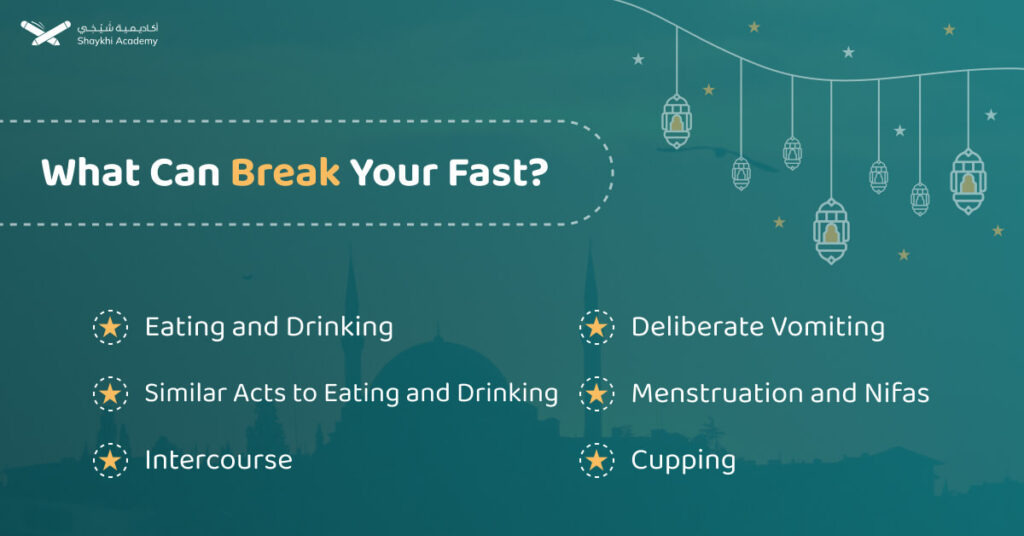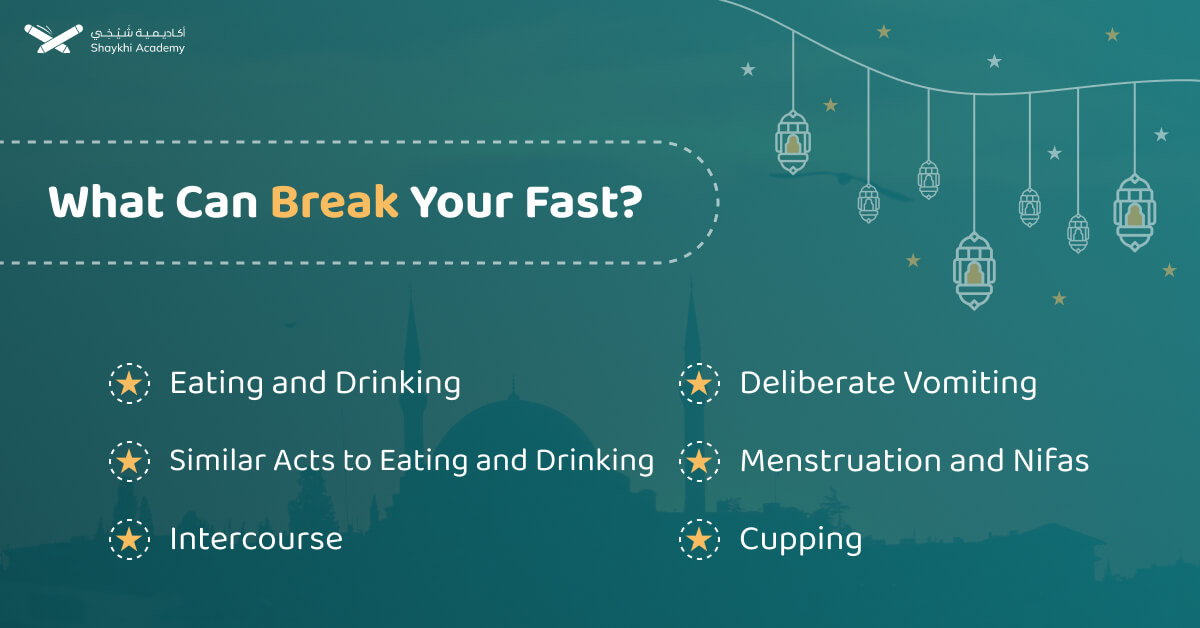Fasting in Ramadan is invalidated by intentional eating, drinking, sexual intercourse, self-induced vomiting, and ejaculation. Women must also refrain during menstruation or postnatal bleeding.
Smoking and cupping are debated among scholars, while backbiting weakens spiritual rewards. Pregnant and breastfeeding women can break their fast if necessary, with conditions to compensate. If fasting is broken without a valid reason, repentance and making up missed days are required.
What Breaks the Fast for Men?
Fasting is invalidated if a man intentionally eats or drinks, engages in intercourse, masturbates, deliberately vomits, or apostatizes. Additionally, losing consciousness throughout the entire day or experiencing complete insanity nullifies the fast.
What Breaks the Fast for Women?
For women, menstruation and postnatal bleeding automatically break the fast, requiring them to make up for missed days later. As Aisha (RA) narrated, women in the Prophet’s time were required to compensate for fasting but not for missed prayers.
Meaning of Iftar (Breaking Fast)
Iftar literally translates to “breakfast” in Arabic. However, within the context of Ramadan, the term carries a deeper significance and essentially encompasses two interpretations. Firstly, Iftar refers to breaking the fast in the literal sense, indicating the act of consuming food or drink for example during the daylight hours of Ramadan, thereby nullifying the fast for that day.
Iftar also marks the end of a day’s fast, a time to give thanks to Allah for the strength and blessings received. Traditionally, Muslims break their fast with dates, following the practice of Prophet Muhammad (peace be upon him). This is often followed by a light meal and then a larger dinner enjoyed with family and friends. Mosques frequently host community Iftar gatherings, fostering a sense of togetherness and compassion.
What Can Break Your Fast in Ramadan?
During Ramadan, Muslims must refrain from eating, drinking, engaging in sexual activity, inducing vomiting, and letting blood via cupping during fasting hours. Women experiencing menstruation or postpartum bleeding are exempt from fasting but must make up for missed fasts later.

These practices ensure the integrity of fasting and uphold religious obligations during this sacred month. Here is what invalidates fast in Ramadan:
1. Eating and Drinking
Consuming any food or drink, including water, through the mouth during fasting hours invalidates the fast. It’s essential to refrain from ingesting anything that nourishes the body, as the purpose of fasting is to abstain from worldly desires and focus on spiritual growth. Muslims are reminded to exercise discipline and restraint during Ramadan, resisting the temptation to eat or drink until after sunset.
2. Similar Acts to Eating and Drinking
Certain actions that mimic the effects of eating and drinking, such as blood transfusions or receiving nourishing substances via injection, also invalidate the fast. Any intake of substances that provide nourishment to the body during fasting hours breaks the fast. Muslims should be cautious and avoid any medical procedures or treatments that involve the introduction of nourishing substances into the body during Ramadan to ensure the validity of their fast.
3. Intercourse
Engaging in sexual relations during fasting hours is considered a grave violation of fasting rules. This includes any form of sexual activity that involves penetration. It’s essential for Muslims to uphold the sanctity of fasting during Ramadan by refraining from all forms of sexual activity that involves penetration during daylight hours.
4. Deliberate Vomiting
Intentionally inducing vomiting breaks the fast. However, if vomiting occurs involuntarily and is beyond one’s control, the fast remains valid. Deliberate vomiting during fasting hours demonstrates a lack of commitment to the spiritual discipline of Ramadan and undermines the purpose of fasting. Muslims are encouraged to maintain self-control and refrain from actions that compromise the integrity of their fast.
5. Menstruation and Nifas
Women experiencing menstruation or postpartum bleeding are exempt from fasting during these periods. The onset of menstruation or postpartum bleeding nullifies the fast until the bleeding ceases. It’s essential for women to make up for the missed fasts once they are no longer menstruating or experiencing postpartum bleeding. This exemption acknowledges the physiological differences and challenges faced by women during these times and ensures equity in fulfilling religious obligations.
6. Cupping
Letting blood via cupping during fasting hours is considered invalidating the fast. The extraction of blood through cupping affects the body’s nourishment and thus nullifies the fast. Muslims observing fasting during Ramadan should refrain from undergoing cupping until after sunset. This precaution ensures that individuals maintain the integrity of their fast and fulfill their religious obligations during the blessed month of Ramadan.
Some scholars, including Imam Ahmad, believe that cupping breaks the fast based on the hadith: “The one who cups and the one who is cupped have both broken their fast.” However, other scholars like Imams Abu Hanifa, Malik, and Shafi’i argue that it does not.
Is Smoking Allowed While Fasting?
Smoking invalidates fasting since any substance entering the body, including smoke, is considered nourishment. This applies to all forms of smoking, including e-cigarettes.
Fasting for Pregnant and Nursing Women
If a pregnant or nursing woman fears harm from fasting, she may break her fast and make it up later, similar to a sick person. If the concern is solely for the child, she must also provide food to the needy in addition to making up the fast.
Does Gossiping or Backbiting Break the Fast?
While gossip and backbiting do not technically invalidate fasting, they diminish its spiritual rewards. The essence of fasting includes self-restraint, which involves refraining from harmful speech.
What Happens If Someone Breaks Their Fast Without an Excuse?
A person who deliberately breaks their fast without a valid reason commits a grave sin and must sincerely repent. They are also required to make up for the missed day, though scholars differ on whether an additional penalty (kaffarah) is necessary.
Does Using Eye Drops or Brushing Teeth Break the Fast?
Eye drops do not invalidate fasting unless they reach the throat. As for toothpaste, it is permissible but should be used cautiously to avoid swallowing any residue.
Fasting is a sacred obligation in Islam, requiring mindfulness in both actions and speech. To ensure your fast remains valid, it’s essential to understand and follow these rulings.
Ready to take your Quran memorization journey to the next level with Shaykhi Academy?
Embark on a transformative journey of Quranic education with Shaykhi Academy. Our platform offers unparalleled access to expert tutors, flexible scheduling options, and affordable rates, ensuring that Quranic learning is accessible to all. Choose from a diverse range of courses, including Quran recitation, Tajweed, Arabic language, and Islamic studies, tailored to meet the needs of learners at every level.
Why Choose Shaykhi Academy?
- Connect with highly qualified native tutors.
- Flexible scheduling to suit your busy lifestyle.
- Affordable classes tailored for all levels.
- Accessible from anywhere around the globe.
- Diverse Courses.
Discover Our Range of Courses:
- Arabic Noorani Qaida: Lay a solid foundation for Quranic studies.
- Online Quran Classes for Kids: Engaging lessons for lifelong learning.
- Tajweed Rules for Kids: Learn to recite with confidence.
- Quran Hifz for Kids: Step-by-step guidance to memorize the Quran.
- Quran for Adults: Introduce yourself to Quran reading and Tajweed rules.
- Online Arabic Courses: Master the language of the Quran.
- Islamic Studies: A wide range of topics related to Islam, including theology, law, Quranic studies, Hadith.
Join our community today and unlock the power of Quranic education with Shaykhi Academy!

Conclusion:
Fasting during Ramadan is a sacred act of worship in Islam, requiring Muslims to abstain from food, drink, and other nullifiers from dawn to sunset. For men, fasting is broken by intentional eating or drinking, deliberate sexual intercourse, intentional vomiting, ejaculation through self-stimulation, apostasy, and unconsciousness lasting the entire day.
Women, in addition to these, must refrain from fasting during menstruation or postnatal bleeding and make up missed days later.
Other debated issues include cupping, smoking, and the use of eye or ear drops, which scholars have differing opinions on. Pregnant and breastfeeding women can break their fast if they fear harm, with requirements to make up missed days or feed the needy.
While backbiting and gossip do not technically invalidate fasting, they diminish its spiritual reward. If fasting is broken without a valid reason, sincere repentance and making up for the missed fast are necessary. Understanding these rules helps ensure a valid and spiritually fulfilling Ramadan.

















































